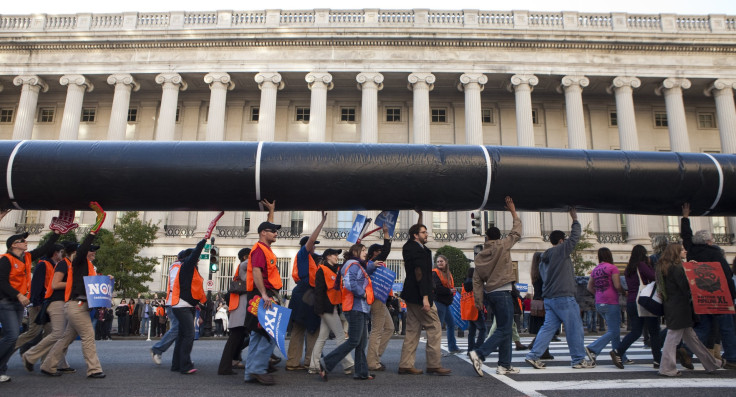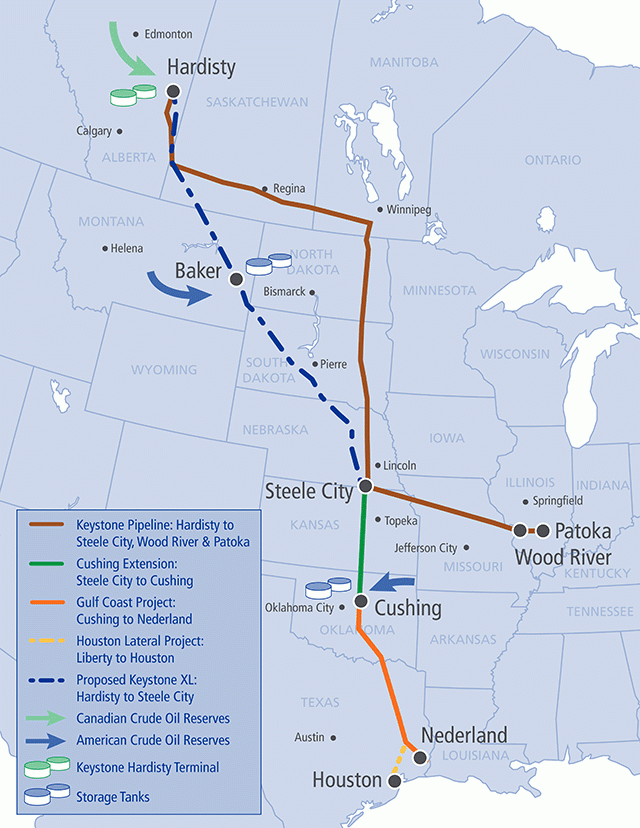Midterm Elections 2014: Republican Senate Victories Boost The Odds For Controversial Keystone XL Pipeline Project

The odds of the Keystone XL pipeline being built increased Tuesday night after Republicans clinched control of the U.S. Senate. The GOP now has enough votes in Congress to force a decision by President Barack Obama on the long-delayed Canada-to-Texas oil project, and proponents could potentially gather enough support to override a presidential veto.
Republicans will hold at least 52 Senate seats in January after ousting three incumbent Democratic senators and securing four vacant seats previously held by Democrats, the Associated Press reported. The GOP could rack up even more gains after races in Alaska and Virginia are decided and following a Dec. 6 runoff election in Louisiana.
The Obama administration has been reviewing the Keystone XL proposal for the past six years. In that time, both supporters and opponents have seized the issue as a political litmus test for the president. Build the crude-oil pipeline, backers say, and spur economic growth by creating American construction and energy jobs. Block the project, Democrats and environmental groups urge, and protect the environment while fighting climate change.
The Keystone XL would ship 830,000 barrels a day of heavy crude oil from Canada’s tar sands region down to refineries on the U.S. Gulf Coast. A 487-mile southern leg has already been built. But the proposed 1,200-mile leg from Alberta to Nebraska still needs a permit from the U.S. State Department, since it crosses international borders.
TransCanada Corp., the pipeline’s builder, saw its stock jump nearly 3 percent, or $1.30, to $49.67 in Wednesday's early-afternoon trading.
On Tuesday, the company raised the project’s price tag from $5.4 billion to $8 billion due to delays in the regulatory process, Canadian Press reported.

Republicans in the U.S. House of Representatives have tried eight times to force Obama’s hand on the project in recent years. But the Democratic-led Senate managed to keep nearly all pro-pipeline legislation off the floor. Now, with both chambers in GOP control, Republicans are vowing to make the Keystone XL a top priority when the new Congress convenes in January.
“We will pass a budget in both chambers, number one, and we will pass the Keystone pipeline, number two,” Republican National Committee President Reince Priebus told MSNBC on Tuesday. “And I actually think the president will sign the bill on the Keystone pipeline because I think the pressure -- he is going to be boxed in on that, and I think it’s going to happen.”
Next year’s Senate will have at least 61 vocal pipeline supporters -- just enough to surpass the 60-vote threshold to block filibusters and advance debate, FuelFix.com, an energy news site, reported. Pro-Keystone senators would still be short of the two-thirds majority needed to override the president, unless Republicans can convince fossil fuel-state Democrats to join their side.
But that might not matter, FuelFix noted. The Obama administration might decide to “approve the project to rob the GOP of an early-session victory lap,” Kevin Book, an analyst at ClearView Energy, wrote in a research note. The pipeline could also be offered “as an olive branch to the new Republican leadership.”
Opponents, however, say they are confident Obama and Democratic leaders will pull together to block the project -- especially given concerns about Keystone XL’s impact on climate change. Jamie Henn, co-founder of the environmental advocacy group 350.org, noted that 18 U.S. climate scientists have urged Obama to reject the project on the basis of greenhouse gas emissions. “Post-election, President Obama will start focusing on his legacy, and pipeline approval would tar over whatever climate bona fides the president has in mind,” Henn wrote in a Huffington Post blog post.
The Natural Resources Defense Council vowed to "ensure that the White House blocks any attempts to interfere with the president's authority," David Goldston, the group's director of government affairs, said in an interview. He said the New York City-based organization will keep "doing what we've been doing all along: laying out substantive arguments for why the pipeline would seriously set back efforts to address climate change, and, secondly, showing the extent of opposition to the pipeline ... and making sure those voices are heard."
The Obama administration has delayed its decision until a dispute in Nebraska is resolved. The Nebraska Supreme Court is considering a ruling that could invalidate the pipeline’s route through that state, which would force TransCanada to revise its plans.
The builder could face similar delays in South Dakota, where state utility regulators are deciding whether to renew an expired construction permit. The state’s Public Utilities Commission last month gave opponents an important boost by allowing more than 40 environmental groups, tribal leaders and landowner activists to participate in the legal proceedings.
© Copyright IBTimes 2024. All rights reserved.





















